Table of Contents
Having an ac unit blowing warm air on a hot summer day can be a homeowner’s worst nightmare. As temperatures climb, the promise of cold, refreshing air becomes increasingly important for comfort and well-being. But when that promise is broken, people become frustrated and start looking for answers. To quickly resolve the problem and restore interior comfort, it is essential to understand the underlying causes of warm air being blasted by an air conditioner.
This guide explores 9 of the most frequent causes of this annoying issue and offers workable solutions to restore cool air circulation. Every possible reason will be thoroughly investigated, ranging from difficulties with electrical failures and thermostats to problems with ventilation and refrigerant levels. Equipped with this understanding, homeowners can more precisely identify the issue, possibly averting expensive repairs or pointless service requests.
Restoring your air conditioning unit to peak performance is possible with the correct repair methods and proactive attitude, guaranteeing a cool and cozy interior atmosphere even on the hottest days. Let’s explore the causes and the solution.
you can also fix the problem when your AC unit is leaking water with this detailed guide.
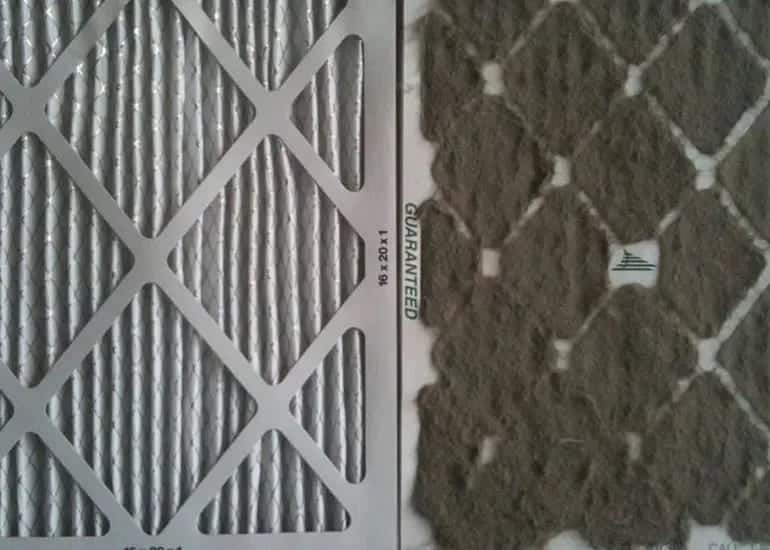
1.Dirty Air Filter:
A dirty air filter is one of the most frequent causes of your air conditioner producing heated air rather than cool air. This small part is essential to operating your cooling system at peak efficiency. If the filter becomes clogged with dirt, dust, and debris, your air conditioner will have to work harder and less efficiently, restricting airflow.
For best AC performance, clean or replace your air filter regularly. A dirty filter might eventually harm your air conditioning system, obstruct airflow and increase energy consumption.
If your air conditioning equipment produces warm air, your first line of repair should be to examine and replace the air filter. Luckily, resolving this problem is not too difficult or expensive. All you have to do is find the air filter, which is usually located within the air return vent of your home or behind an enclosure or panel on your AC unit, and clean or replace it as necessary.
Ensure your air filter is clear of debris and clean to avoid various AC issues, such as insufficient cooling, higher energy costs, and expensive repairs. Inspect and replace your air filter periodically to maintain the smooth and effective operation of your air conditioning system.
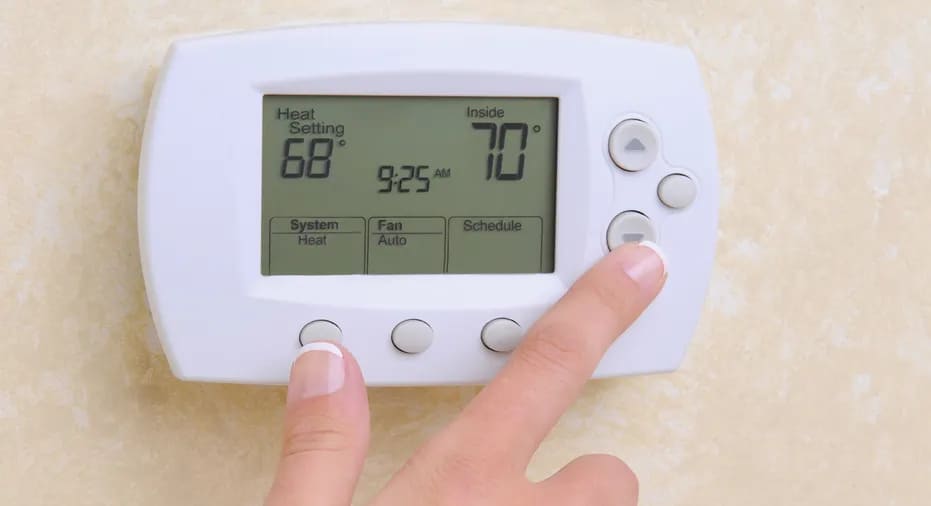
2. Thermostat Settings
It is irritating when your air conditioning equipment begins to circulate warm air rather than cold air. Check the settings on your thermostat, though, before you lose your cool. Your thermostat regulates when your house should be heated or cooled, serving as the HVAC system’s control panel. Improper thermostat settings can cause your air conditioning problems.
First, make sure your thermostat is in the “cool” mode. Even though it seems obvious, sometimes people miss this step. Next, examine the temperature setting. If it is set too high, it may not activate to chill the air adequately.
Another typical problem is a frozen evaporator coil. This happens when airflow is impeded by blocked vents or clogged air filters. When the coil freezes, the AC unit blows heated air rather than cool air. When this occurs, turn off the air conditioning to allow the ice to thaw before addressing the underlying issue causing the limited airflow.
If the problem continues even after checking your thermostat settings, calling a qualified HVAC expert could be necessary. They can precisely analyze the issue and make sure your thermostat and air conditioner are operating in unison to maintain your house’s comfort.
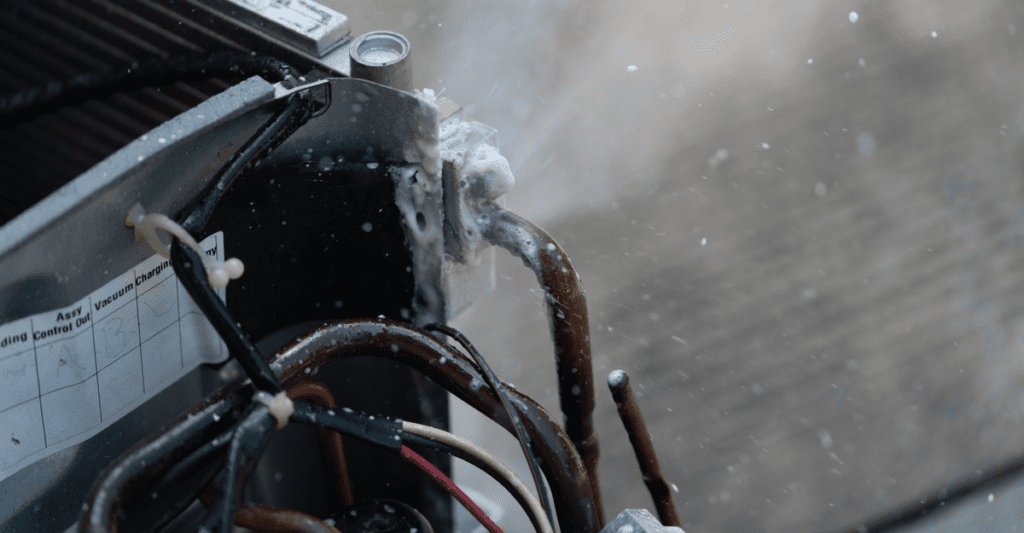
3.Refrigerant Leak
A refrigerant leak may cause your air conditioner to emit hot air rather than the cool, pleasant air you expect. The secret element that makes your air conditioner work is refrigerant, which takes heat from within your house and distributes it outdoors. However, if there is a leak, your air conditioner won’t have enough refrigerant to function correctly.
Your air conditioner producing warm air instead of the cold, crisp air you’re used to is one of the first indications that there may be a refrigerant leak. This occurs because the system cannot efficiently remove heat from your home’s air without refrigerant. Rather, it’s just circulating the warm air that already exists.
Ignoring a refrigerant leak can eventually result in more serious issues. It can also make your AC work harder, increasing energy costs and harming other parts of the system, decreasing its ability to cool your house.
It’s critical to contact a qualified HVAC expert to identify and fix any refrigerant leaks you suspect. To get your air conditioner blowing cold air again, they may find the leak, fix it, and replenish your system with the right amount of refrigerant.
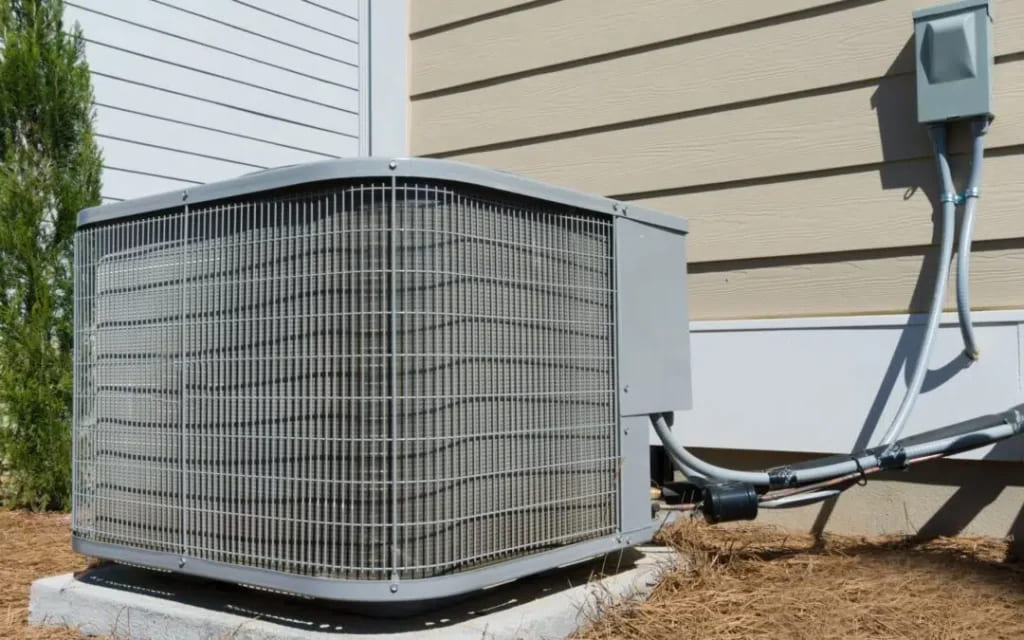
4. Blocked Condenser Unit
One possible cause of warm air coming from your air conditioner is a clogged condenser unit. The condenser, which is housed in the exterior unit, is a key component in cooling your house. When it’s blocked, ventilation is limited, which causes the air conditioner to blow heated air. Debris, such as leaves, mud, or overgrown vegetation, can cause this obstruction.
First, switch off the air conditioner to prevent further harm and address this problem. Next, thoroughly check the outdoor unit to ensure no obstacles are present. Clear the space surrounding the device to allow enough airflow and remove any debris you uncover. Check the inside air filter because a filthy filter might obstruct airflow and cause related issues.
Routine maintenance, which includes cleaning the condenser unit and changing the air filters, can avoid blockages and ensure effective cooling. However, if the problem continues even after cleaning, expert assistance is essential to identify and treat any underlying issues with your AC system.
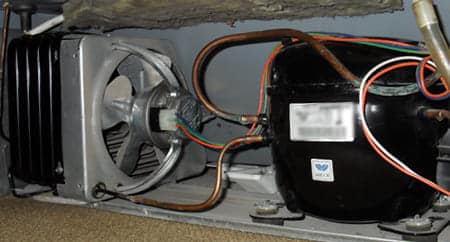
5.Faulty Compressor:
If your air conditioner is producing warm air, there could be a problem with the compressor. The compressor is a key component of your air conditioning system’s exterior unit, which cools your house. When it breaks down, it can provide uncomfortable indoor conditions and ineffective cooling.
A faulty compressor may result from several problems, including mechanical breakdowns, refrigerant leakage, or electrical faults. Issues with the wiring or capacitor may give rise to electrical problems that impair the compressor’s performance. When the compressor works hard to circulate insufficient amounts of refrigerant, leaks in the refrigerant might decrease cooling performance. Mechanical malfunctions such as faulty pistons or worn-out bearings might also hinder the compressor’s capacity to compress refrigerant efficiently.
If your air conditioner is producing warm air, it is imperative that you have a qualified HVAC technician check the compressor and identify the problem as soon as possible. Early intervention can prevent additional damage and restore your home’s effective cooling system.
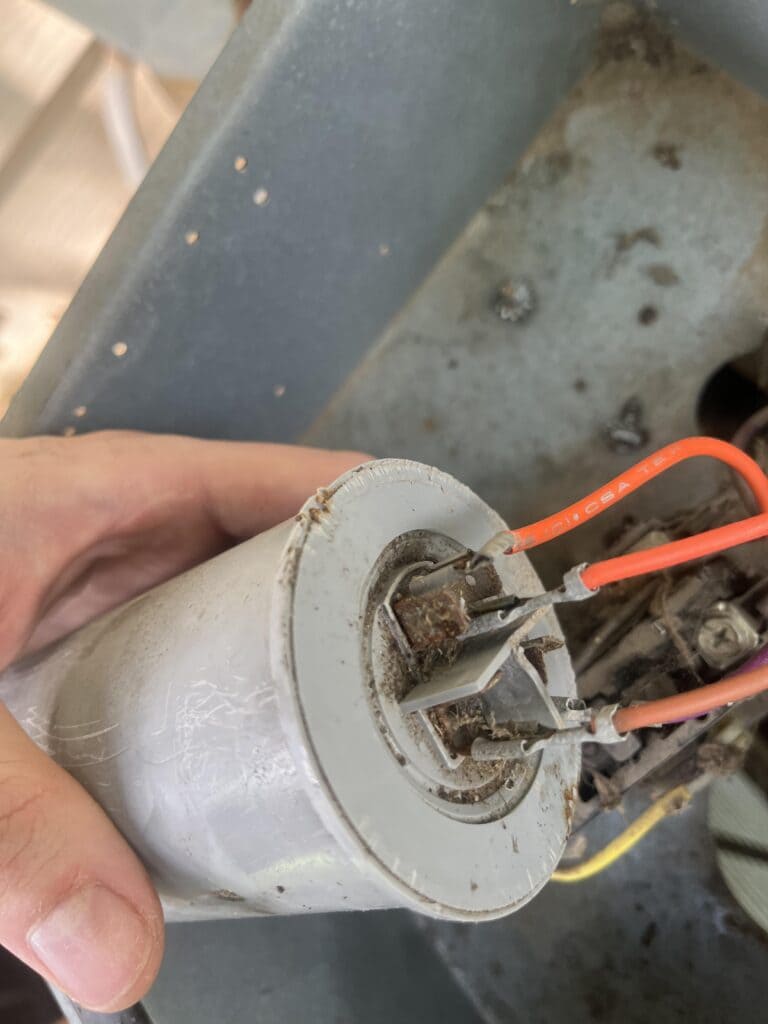
6.Faulty Capacitor:
A faulty capacitor may be the cause if your air conditioner begins to blow warm air rather than chilly air. Capacitors are essential parts that store electrical energy and help the AC motor start and run. A malfunctioning capacitor can interfere with the cooling process. Inconsistent cooling, hot air blasting from the air conditioner, or failure to start are indicators of a faulty capacitor. An HVAC expert can measure the capacitance of the capacitor and ensure it is within specifications to diagnose the problem. The AC quickly returns to working order when a malfunctioning capacitor is replaced, keeping your house cool.
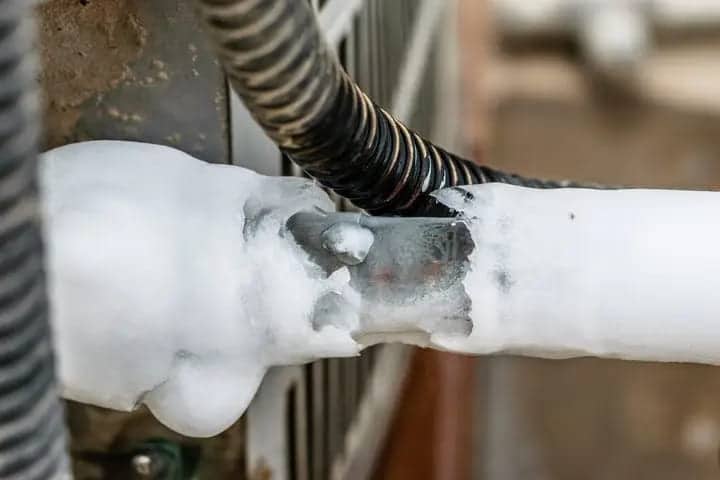
7.Frozen Evaporator Coil
Your AC unit may have a frozen evaporator coil if ac unit blowing warm air rather than the cool, pleasant breeze you want. This happens when the coil gets too cold, and the condensation freezes when it comes into contact with it. What was the outcome? Eventually, your air conditioner may only produce hot air due to decreased airflow. Turn off the air conditioning system and let the coil defrost. Next, look for barriers to airflow, including blocked vents or filthy filters. By preventing this problem with routine maintenance and airflow checks, you can ensure your air conditioner runs smoothly and keeps you comfortable all year.
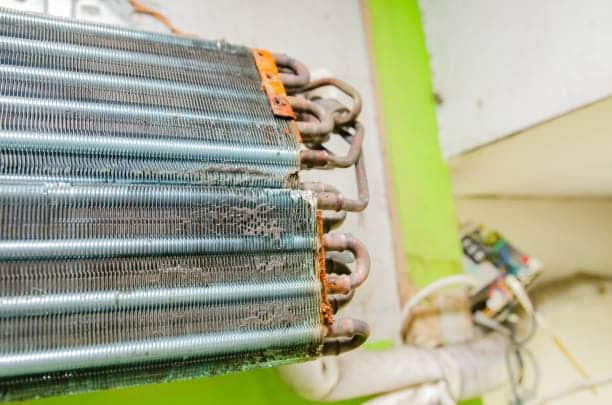
8.Dirty Evaporator Coil:
Your AC unit may cause a dirty evaporator coil if ac unit blowing warm air instead of the refreshing breeze you want. Due to its ability to absorb heat from the air, this essential component helps chill your home. Dust and other debris build up on the coil over time, making it less effective at transferring heat. This makes it difficult for your air conditioner to generate cool air, which makes hot days uncomfortable. This problem can be avoided with routine maintenance, such as expert cleaning or servicing. Maintain a clean evaporator coil to ensure your air conditioner blows cool, refreshing air—not heated.
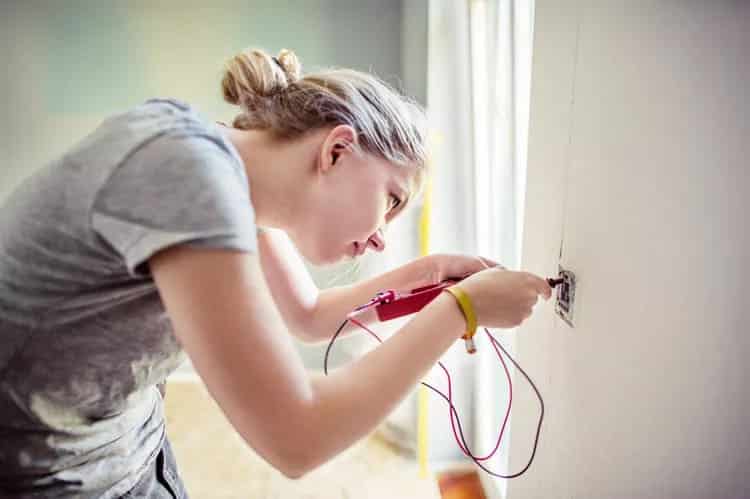
9. Electrical Issues
Several electrical problems could be caused if your ac unit blowing warm air rather than the refreshing comfort you desire. A compressor that isn’t working correctly can often cause an air cooling issue. Hot air circulation may result from malfunctioning contactors or capacitors that impair the compressor’s performance. In addition, clogged air filters impede airflow, which makes the unit work harder and emits heated air. Poor electrical wiring, such as broken or loose wires, might prevent adequate cooling. Frequent maintenance can help avoid these problems and guarantee that your air conditioner produces cold, refreshing air, such as filter checks and electrical inspections.
